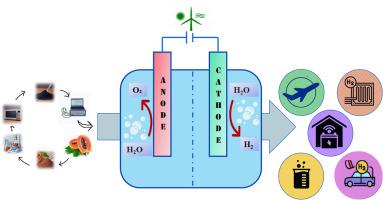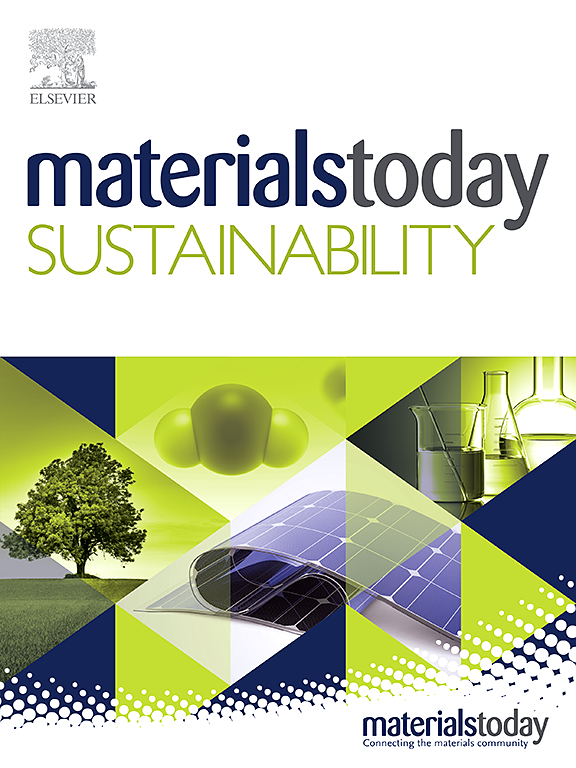Microwave-assisted synthesis of Ni-doped carbon from bio-waste as a cost-effective electrocatalyst for effective and sustainable water electrolysis
IF 7.9
3区 材料科学
Q1 GREEN & SUSTAINABLE SCIENCE & TECHNOLOGY
引用次数: 0
Abstract
The synthesis of cost-effective, easily synthesizable electrocatalysts for oxygen evolution reaction (OER) and hydrogen evolution reaction (HER) is crucial for advancement in sustainable hydrogen generation. The present study presents a facile synthesis of nickel-doped carbon (Ni@C) from bio-waste by microwave-assisted method as a highly efficient and sustainable electrocatalyst for the splitting of water. Physicochemical characterisation of the synthesised electrocatalyst confirms the effective incorporation of nickel in the carbon matrix, leading to the enhancement in electrocatalytically active sites. Evaluation of electrochemical parameters in 1 M KOH displays 280 mV and 180 mV overpotentials for OER and HER at 10 mA/cm2. Full cell electrolysis demonstrates the promising and excellent electrocatalytic behaviour at a potential of 1.65 V. Prolonged stability tests showed excellent durability for 100 h. The synthesised Ni@C electrocatalyst from bio-waste offers an environmentally friendly, easily synthesizable and cost-effective alternative for the production of hydrogen by water electrolysis. Integrating solar energy systems with electrolysis enables high-scale and sustainable hydrogen generation, leading towards the transformation into renewable energy technologies.

微波辅助生物废弃物合成镍掺杂碳作为高效、可持续的水电解电催化剂
制备成本低、易于合成的析氧反应(OER)和析氢反应(HER)电催化剂对于推进可持续制氢技术至关重要。本研究提出了一种利用微波辅助方法从生物废物中快速合成掺杂镍碳(Ni@C)作为高效可持续的水分解电催化剂。合成的电催化剂的物理化学特征证实了镍在碳基体中的有效结合,导致电催化活性位点的增强。在1 M KOH条件下的电化学参数评价显示,在10 mA/cm2下,OER和HER的过电位分别为280 mV和180 mV。在1.65 V的电势下,全电池电解表现出良好的电催化性能。长时间的稳定性测试显示出100小时的优异耐久性。从生物废物中合成的Ni@C电催化剂为水电解制氢提供了一种环境友好、易于合成且具有成本效益的替代方案。将太阳能系统与电解相结合,可以实现大规模和可持续的制氢,从而向可再生能源技术转型。
本文章由计算机程序翻译,如有差异,请以英文原文为准。
求助全文
约1分钟内获得全文
求助全文
来源期刊

Materials Today Sustainability
Multiple-
CiteScore
5.80
自引率
6.40%
发文量
174
审稿时长
32 days
期刊介绍:
Materials Today Sustainability is a multi-disciplinary journal covering all aspects of sustainability through materials science.
With a rapidly increasing population with growing demands, materials science has emerged as a critical discipline toward protecting of the environment and ensuring the long term survival of future generations.
 求助内容:
求助内容: 应助结果提醒方式:
应助结果提醒方式:


